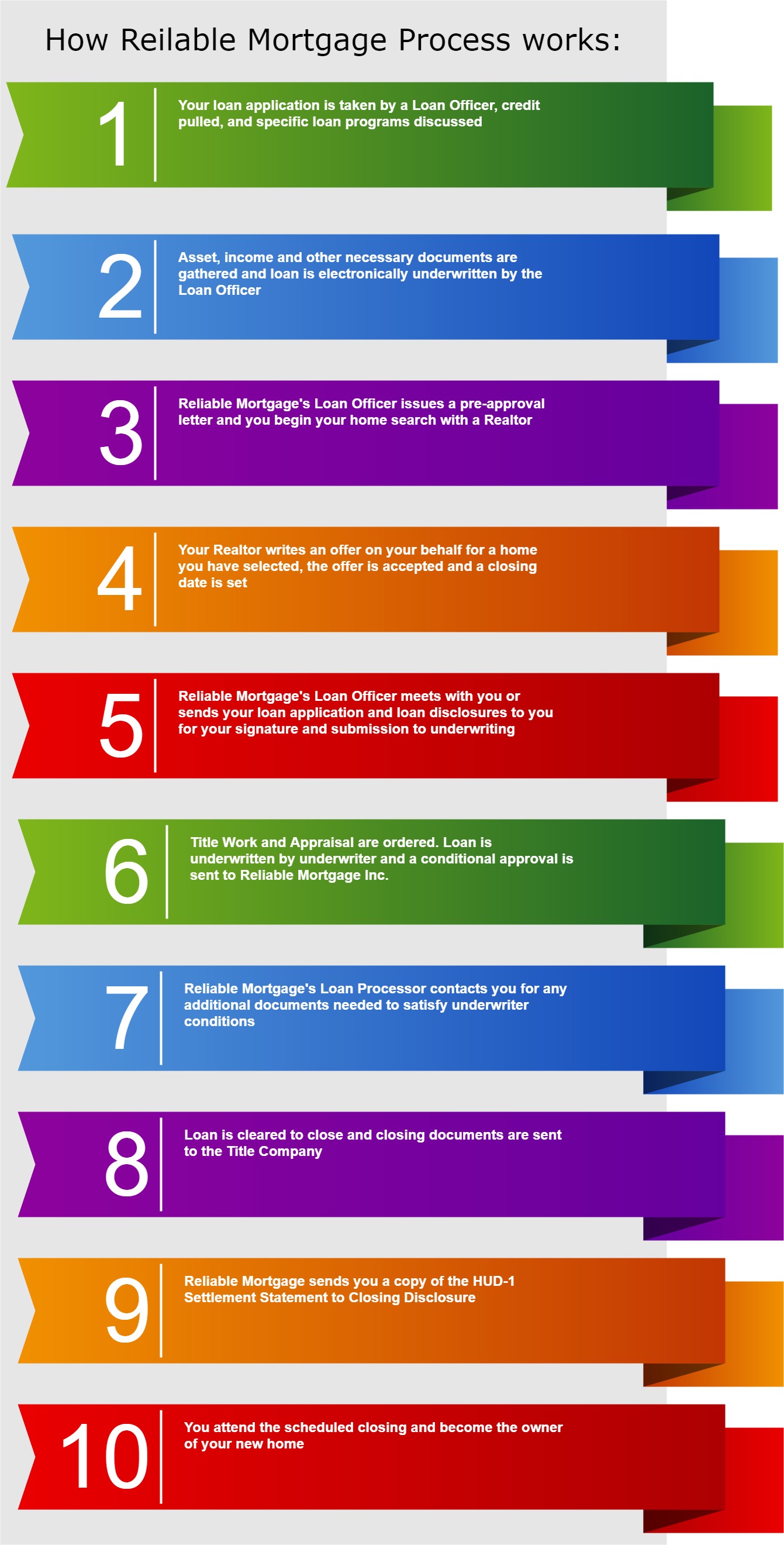The Loan Process
Our step-by-step process is designed to keep your loan application on schedule for a smooth closing. As we meet the major milestones during the process, our staff will be updating you on the status of your loan application. You will experience a new level of comfort and satisfaction when you choose to work with Reliable Mortgage!
The Loan Process for a Purchase

The Loan Process for a Refinance
Omit steps 3, 4, and 10 (above) for a Refinance Loan.
Real Estate Appraisal

An appraisal is a document that gives an estimate of a property’s fair market value. It ascertains the market value of a property. The appraisal is performed by an “appraiser” who is typically a state-licensed individual trained to use existing data to determine a home’s valuation. In an appraisal, consideration is given to the property, its location, amenities, and the current market values of similar properties.
An appraisal is a necessary step in the home purchase or home refinance process. Most lenders will not lend on a property without an appraisal. Below are a few more reasons why an appraisal might be necessary:
- To determine a value when selling a home.
- To contest high property taxes.
- To finalize and settle a divorce.
- To settle an estate.
- To use as a negotiation tool when selling.
- To establish the replacement cost (insurance purposes).
- To protect your rights in an eminent domain case.
- To refinance.
We then arrange an appraisal of the property to determine its fair market value. The appraiser will visit the property and compare its features, floor plan, lot, etc. to other similar properties in the area. (You will receive a copy of the appraisal at closing.) We also obtain a title report (an attorney's opinion) at this time. This will tell us the legal details of the property including any liens against it (i.e. another loan). An appraisal is a document that gives an estimate of a property’s fair market value. It ascertains the market value of a property. The appraisal is performed by an “appraiser” who is typically a state-licensed individual trained to use existing data to determine a home’s valuation. In an appraisal, consideration is given to the property, its location, amenities, and the current market values of similar properties. Additional Appraisal Information
Final Approval
Now it's time for "underwriting" to look over all the paperwork and loan details and agree that it supports the preliminary approval. Underwriters look for these key items, among others:
- The Property: In this case, they review the appraisal report.
- Total Debt Ratio: This is the ratio between all your sources of income against all your debts.
- Cash Reserves: After your loan settlement costs are paid, this is the amount of money left over in your bank account.
- Credit History: Looking at your past debts and payment history is a measure of how likely and able you will be to repay your loan.
- Employment History: This isn't only how much you make, but how stable is your income.
Closing

Reliable Mortgage closings go quite smoothly - because we make sure everything is in order on our end, and that you are educated about the process. This is where you will be expected to take care of the closing costs, and the balance of your down payment.
At the closing, ownership of the newly purchased home is officially transferred to you. It may involve you, the seller, the real estate agent, representatives from the title or escrow firm, and a variety of clerks, secretaries, and other staff. Closing can take as little time as an hour to sign all the forms and transfer ownership or it can take several hours, depending on the contingency clauses in the purchase offer (and any escrow accounts that may need to be set up).
Before you close on the house, you should have a final inspection, or walk-through, to make sure any repairs you requested have been made and that items which were to remain with the house (drapes, light fixtures) are still there. This is when you must call attention to any problems or issues you see with the home that should not be present.
In most states, settlement is done by a title or escrow firm to which the appropriate cashiers’ check, and the firm will make the necessary disbursements. The real estate agent or another representative of the title company will deliver the check to the seller and the house keys to you. Closing Costs
Credit report
A credit report is required on all purchase and refinance transactions. This is how the lender gauges your credit worthiness.
Private Mortgage Insurance
If your down payment is less than 20%, many lenders will require that you purchase private mortgage insurance (PMI) for the amount of the loan. This way, if you default on the loan, the lender will recover lost monies. These insurance premiums will continue until your principal payments plus down payment equal 20% of the selling price, but they may continue for the life of the loan.
Escrow Account
An escrow account or impound account is a fund into which you will make monthly payments for taxes, homeowner’s insurance, and PMI (mortgage insurance, if required). These monies are collected on a monthly basis and will pay your insurance and tax bills when they come due every six month. The goal is to have these monies put aside in small amounts every month versus having a large lump sum bill come due every six months.
Prepaid Interest
Your first regular mortgage payment is usually due about 6 to 8 weeks after you close (for example, if you close in August, your first regular payment will be in October; the October payment covers the cost of borrowing money for the month of September). Interest costs, however, start as soon as you close. The lender will calculate how much interest you owe for the fraction of the month in which you close (for example, if you close on August 25, you would owe interest for 6 days). In some cases this is due at closing. In a refinance transaction you will also owe monies to your old lender. In the previous example you would owe 25 days to your old lender. In a refinance you are typically paying about one month’s worth of interest in the transaction every time you refinance. This is offset by the first month gap in which you will NOT make a mortgage payment immediately after refinancing.